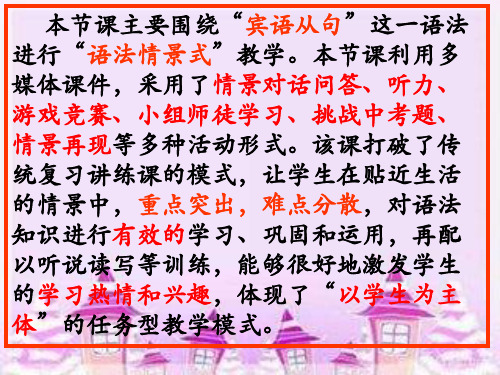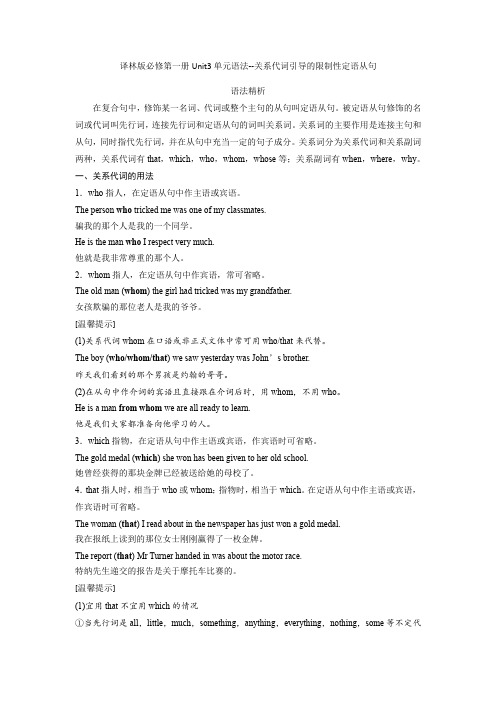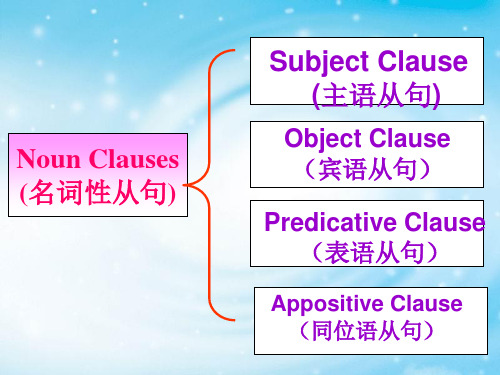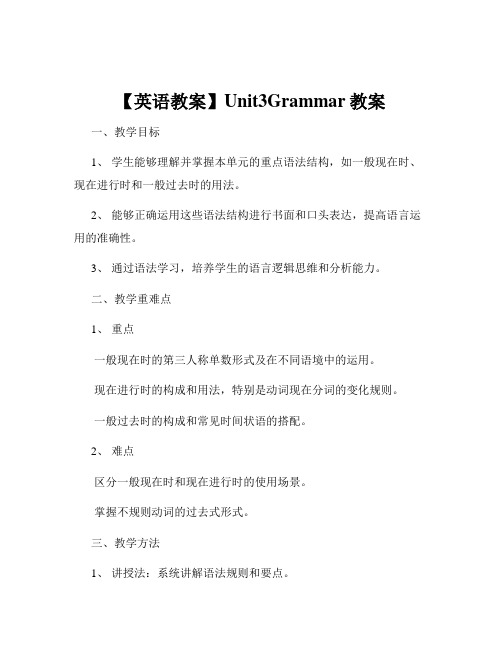9B Unit3 Grammar
9B_U3_Grammar(正式)

初 中 英 语
九 下
4 Take a map of Beijing with you while traveling unless you have a guide or know Beijing well. b 5 Unless the weather forecast says it is going to rain, you do not have to take an umbrella or a raincoat with you. f 6 Do not miss the traditional snacks in Beijing, unless you do not like Chinese a food.
You cannot imagine how amazing they are unless you see them with your own eyes.
初 中 英 语
九 下
If you don’t have a map, you’ll get lost easily. Unless you have a map, you’ll get lost easily. You’ll get lost easily unless you have a map.
初 中 英 语
九 下
Part Two Practice (Page 48)
1 Unless you want to buy lots of souvenirs, we suggest you not taking a lot of money with you. d 2 There is no need to get up very early in the morning unless you want to watch the raising of the national flag. c 3 Unless you are in a hurry, you do not need to take a taxi. e
人教英语九年级全册Unit3Grammar (共55张PPT)

1. Could you tell me_______? A. what did he happen
解题步骤:
B. who stole my bike
C. what the matter with him is
1.语序排除
D. which the way to Tom’s home is
2. He asked me______. A. if she will come
(发现语法)
幸福皇宫
Round 1
Approaching Grammar (感知语法)
迪士尼乐园
魔法森林
梦幻小木屋
Get to know the main characters!
Snow White
白雪公主
Queen
皇后
Prince
王子
I miss my mother so much, Where is my mother? Where is my mother?
wiswloshihvlol twhehgairtl
what--apple will--pear
ee whether love--pear
whether-apple
she--banana
Rules之时态1
She says that the apple _is_deliciou一s般. 现在时 They ask where she _w_i_ll(pickk) flowe一rs般to将m来o时rrow.
A. where B. how C. what D. why
根据题意。
解题方法: 19876543210543210
语境排除法
Task 3: Find out the other ruleRs!ules之语序
Unit3Grammar课件牛津译林版英语九年级上册

▲
学习目标 新知学习 重点研讨 课堂小结 当堂检测
A2 Daniel has some questions. Rewrite his questions by using object clauses introduced by question words.
1 Why do I always feel tired in class? 2 How much sleep do we need every day? 3 Which method should I use to solve the problem? 4 Where can we buy a good dictionary? 5 How can I improve my English quickly? 6 Whom should we ask for help? 7 What would life be like without hobbies?
▲
学习目标 新知学习 重点研讨 课堂小结 当堂检测
Millie: I'm always feeling tired these days. There's so much homework and I've spent all my time on it.
Sandy:W__h_y_n_o_t_/_W_h_y__d_o_n_'t_y_o_u_/_S_h_a_ll__w_e_ do something fun? Amy: I agree. ___S_h_a_ll_w__e_/W__h_y__n_o_t___ go to the cinema? Sandy: Good idea. But I don't know what films are on now. Millie: I don't want to see any films. Amy: H__o_w_/_W_h_a_t_a_b_o_u_tgoing to the new museum? My dad tells me that it's
Unit 3 Grammar 讲义-高一英语牛津译林版(2020)必修第一册

译林版必修第一册Unit3单元语法--关系代词引导的限制性定语从句语法精析在复合句中,修饰某一名词、代词或整个主句的从句叫定语从句。
被定语从句修饰的名词或代词叫先行词,连接先行词和定语从句的词叫关系词。
关系词的主要作用是连接主句和从句,同时指代先行词,并在从句中充当一定的句子成分。
关系词分为关系代词和关系副词两种,关系代词有that,which,who,whom,whose等;关系副词有when,where,why。
一、关系代词的用法1.who指人,在定语从句中作主语或宾语。
The person who tricked me was one of my classmates.骗我的那个人是我的一个同学。
He is the man who I respect very much.他就是我非常尊重的那个人。
2.whom指人,在定语从句中作宾语,常可省略。
The old man (whom) the girl had tricked was my grandfather.女孩欺骗的那位老人是我的爷爷。
[温馨提示](1)关系代词whom在口语或非正式文体中常可用who/that来代替。
The boy (who/whom/that) we saw yesterday was John’s brother.昨天我们看到的那个男孩是约翰的哥哥。
(2)在从句中作介词的宾语且直接跟在介词后时,用whom,不用who。
He is a man from whom we are all ready to learn.他是我们大家都准备向他学习的人。
3.which指物,在定语从句中作主语或宾语,作宾语时可省略。
The gold medal (which) she won has been given to her old school.她曾经获得的那块金牌已经被送给她的母校了。
4.that指人时,相当于who或whom;指物时,相当于which。
unit 3 grammar

用作状语 1. Being asked to answer the question, she couldn’t refuse. 2. Having been given such a good chance, how would you not value it at all?
7. 作结果状语 He turned off the lights , seeing nothing .
the Passive Voice of
—ing Form
(not) being done (not) having been done
用作主语 1. Being killed by sharks in the sea is a common thing. 2. Being helped out by the killer whales, the whalers were able to make successful kill.
______ to sunlight for too much time will do harm to one’s skin. (上海高考题 2002) A. Exposed B. Having exposed C Being exposed C. D. After being exposed
用作宾语 V-ing 形式既可作动词的宾语, 也 可作介词的宾语。 1.He was afraid of being scolded by the teacher. 2. I remember having been told the story. 3. I didn’t like the idea of being thrown about in a boat on a rough sea.
unit3-grammar-宾语从句与表语从句

无义 1. The mother’s question was that she has no time to look after her daughter.
是否 2.The question is whether that boy will
turn up in time.
….的样子 3. Tom is no longer what he used to be .
4. I don’t know _w__h_e_t_h__eror not he is well.
5. I don’t know _w_h__e_th__erto go.
• 由疑问词引导的宾语从句 用who, whom, what,
when, where, how, whenever等关联词引导 时,连接词在从句中担当 一定成分,具有一定的意 义,从句语序要用陈述语 序。
if / whether
1. I asked her i_f_/_w__h_e_t_h_e_rshe had a bike.
2. We’re worried about _w__h_e_t_h_e_ rhe is safe.
3. I wonder __w__h_e_t_h_e_r_/_ifhe is well.
注意2:whether / if
A. 引导宾语从句时可互换. B. 位于介词后要用whether. C. 位于句首时要用whether. D. 引导表语从句, 主语从句, 同位语
1. He asked (谁能回答这个问题) _w__h_o_c_o_u_l_d__a_n_sw__e_r_t_h_e_q_u__es_t_io_n___.
2. Do you know__w_h_o_m__t_h_ey__a_re__w_a_it_in_g__for (他们在等谁)
9BUnit3学习知识点学习解析总结计划

9B Unit3Welcome解whatever:pron.任何,全部事物whatever用作,“全部,任何事物”,常用来引名性从句。
所引的从句做主,要用数形式。
例:whatevershedidwasright. 她所做的事情都是的。
要点句子解I’mcomplainingaboutyoutotherobotshop.我正在向机器人商铺投你。
Complain:,“诉苦,苦”plainabout/of: 诉苦例句:thedriverscomplainedaboutthebadroad. 司机诉苦道路走。
plainthat⋯...诉苦例句:thestudentscomplainedthatthefoodwastoobad. 学生诉苦食品太差。
向某人诉苦:complaintosb.名形式:complaint例:Healways_______(诉苦)tomeabouthishardworkinthepast.postthisforme.替我把个寄了。
Post在本句中是,“寄,”。
寄某人某物:Postsb.sth=poststhtosb.替某人寄某物:poststhforsb.例句:Ipostedhimaletteryesterday=Ipostedalettertohimyesterday.名:“位,件”Bypost:“通件(种方式)”例句:Isendthegiftbypost. 我寄了礼品。
putout:熄,关灯例句:sheputoutthelightsandthenwentout. 她关了灯,就出去了。
Putthrough:接通例句:canyouputmethroughtotheEnglishdepartment? 你能帮我接通英系?Puton:穿上,戴上:theoldmanforgottoputonthehatwhenhewentout.老人出去忘戴帽子了。
把。
放上去:heputthecoffeecuponthetable.他把咖啡杯放在桌子上。
【英语教案】Unit3Grammar教案

【英语教案】Unit3Grammar教案一、教学目标1、学生能够理解并掌握本单元的重点语法结构,如一般现在时、现在进行时和一般过去时的用法。
2、能够正确运用这些语法结构进行书面和口头表达,提高语言运用的准确性。
3、通过语法学习,培养学生的语言逻辑思维和分析能力。
二、教学重难点1、重点一般现在时的第三人称单数形式及在不同语境中的运用。
现在进行时的构成和用法,特别是动词现在分词的变化规则。
一般过去时的构成和常见时间状语的搭配。
2、难点区分一般现在时和现在进行时的使用场景。
掌握不规则动词的过去式形式。
三、教学方法1、讲授法:系统讲解语法规则和要点。
2、练习法:通过课堂练习和课后作业巩固所学知识。
3、情景教学法:创设真实的语言情景,让学生在情境中体会和运用语法。
四、教学过程1、导入(5 分钟)通过播放一段简短的英语视频或展示一组图片,引导学生观察并描述其中的动作和状态,引出本节课的语法主题。
2、一般现在时(20 分钟)讲解一般现在时的定义、构成和用法。
强调主语是第三人称单数时动词的变化规则。
举例说明,如:He likes music She studies hard给出一些句子,让学生判断是否为一般现在时,并说明原因。
3、现在进行时(20 分钟)解释现在进行时的构成“be +动词的现在分词”,详细讲解动词现在分词的变化规则。
举例:I am reading a book They are playing football设计情景,让学生用现在进行时进行对话练习。
4、一般过去时(20 分钟)介绍一般过去时的概念、构成和常见的时间状语,如 yesterday, last week 等。
展示一些句子,让学生找出一般过去时的动词形式,并说出其过去式。
安排小组活动,让学生分享自己过去的经历,使用一般过去时进行表述。
5、对比与总结(10 分钟)将一般现在时、现在进行时和一般过去时进行对比,分析它们在时间表达和动作状态上的差异。
- 1、下载文档前请自行甄别文档内容的完整性,平台不提供额外的编辑、内容补充、找答案等附加服务。
- 2、"仅部分预览"的文档,不可在线预览部分如存在完整性等问题,可反馈申请退款(可完整预览的文档不适用该条件!)。
- 3、如文档侵犯您的权益,请联系客服反馈,我们会尽快为您处理(人工客服工作时间:9:00-18:30)。
请用宾语从句或宾语+宾补改写句子:
I heard that she was singing in English.
I heard her singing in English.
Mrs Li considers the microwave a great help in cooking.
Mrs Li considers that the microwwave is a great help in cooking.
Exercises:
• I am running quickly so that I can catch the bus. •In order to catch the bus, I am running quickly. • Jim worked so hard that he got a good mark in the English exam.
Helping Mr Jiang look after his mother • You have a poor memory and often forget when to take your pills. • You are always unsure where to find your clothes. • As you often cannot decide which to choose at the supermarket. • You often feel lonely because you do not know who to talk to.
The robot was great!
1.I was too forgetful to lock the door last night. 2.The robot was careful enough to remind me of this. 3.I was too weak to go up and down the stairs often. 4.The robot was kind enough to buy me everything I needed. 5.Sometimes I took a walk with it in order to have a better sleep.
运用“疑问句+动词不定式”将宾语从句转换成简单句。
• The robot no longer knew when it should cook breakfast. • The robot no longer knew when to cook breakfast. • Mr Jiang did not know what he should do with the robot. • Mr Jiang did not know what to do with the robot.
运用动词不定式将目的状语从句或结果状语 从句转换成简单句 too…to太…而不能
•
in order to为了… Mr Jiang is always so busy that he adj.+ enough+ to do does not have any time for hobbies. sth足够 …能够做某事
• When I come back from work, I find my flat as good as new. • When I come back from work, I find that my flat is as good as new. • I consider the robot a great help in my daily life. • I consider that the robot is a great help in my daily life. • I feel it comfortable to live with a robot. • I feel that it is comfortable to live with a robot.
• The robot is so smart that it can do a lot of things for Mr Jiang. • Mr Jiang plans to buy a robot so that he can have more free time.ways so busy that he does not have any time for hobbies. • Mr Jiang is always too busy to have any time for hobbies. • The robot is so smart that it can do a lot of things for Mr Jiang. • The robot is smart enough to do a lot of things for Mr Jiang. • Mr Jiang plans to buy a robot so that he can have more free time. • Mr Jiang plans to buy a robot in order to have more free time.
Excises
• We want know who we can ask for help. to • We can‟t decide what we should to do in the evening. • We don‟t know where we can find information to about teenage problems • We often forget when we should to go back home. • Can you tell me how weto can achieve a balance between study and hobbies
宾语从句的四个变化
3.时态的变化 “I have been to many countries.”Tom said. Tom said he had been to many countries. 4.状语的变化 She said, „I saw a film yesterday.‟ had __________ seen a film She said that she ______ the ________ day before ________ _________.
9B Unit3 Grammar
New words
• • • • • pill n.药片,药丸 unsure adj.不确定,没把握 forgetful adj.健忘的 stair n.楼梯 battery n.楼梯
Review “Object Clause”宾语从句
宾语从句三种句型: 1.肯定句由that 引导 Eg. Mrs Ma said (that) the thief was running away. 2.一般疑问句由if,whether 引导 Eg. I don‟t know if/whether he will go with us. 3.特殊疑问句由 what/whom/whose/when/where/how等引导 Eg.She asked who could answer the question.
•Jim worked hard enough to get a good mark in the English exam.
• Mr Jiang wanted to buy a robot so that he could make his life much easier. Mr Jiang wanted to buy a robot in order to make his life much easier. • We are so busy that we cannot spend time playing. We are too busy to spend time playing.
He thinks that it is too much trouble to own a robot.
He thinks it too much trouble to own a robot.
Talking about the robot
Every day, I notice the robot busy with all kinds of housework. Everyday ,I notice that the robot is busy with all kinds of housework. When I get up, I find my breakfast ready. When I get up, I find that my breakfast is ready.
运用“宾语+宾语补足语”将宾语从句转换成简单 句
He saw that the robot was making breakfast.
He saw the robot making breakfast.
He found that his flat was in a complete mess.
He found his flat in a complete mess.
Betty found that there was a wallet lying on the ground.
Betty found a wallet lying on the ground.
I found it difficult to learn English well.
I found that it was difficult to learn English well.
宾语从句的四个变化
1.人称的变化 • She said,“ I am going to visit my parents.” she • She said that _______ was going to her visit ________ parents. 2.语序的变化 He asked me where had I seen him the I had night before.(改错)
